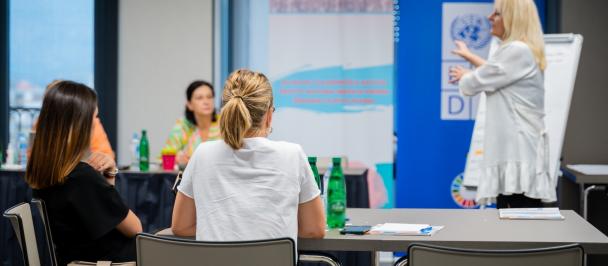Kristina's voice of change against sexism and hate speech
June 18, 2023

Kristina Janković
Kristina Janković lived abroad for 12 years. She grew up in Denmark, and completed part of her law studies in the Netherlands. Today, she is a student at the Faculty of Law of the University of Montenegro dealing with international law and human rights, which, as she says, are "shared values across borders". Kristina became interested in gender equality issues after returning from abroad. At the time, with her colleagues from civil sector, she conducted the first study on menstrual poverty in Montenegro, which showed that one in four women could not afford menstrual hygiene products. That is one of the activities Kristina is most proud of, because it clearly shows how gender equality is an inseparable part of the body of human rights and that gender-based discrimination and sexism are not talked about enough. Kristina believes that challenging social norms and patriarchal patterns, coupled with continuous education, especially of young people, is a task of our society, given that young people in Montenegro show a worryingly high level of tolerance for hate speech. Although almost one in five young people in Montenegro have experienced hate speech, as many as 42% believe expressing hate should be permissible.
The first reflections on gender issues, Kristina recalls, were not easy. She points out that she was not familiar with the term patriarchy until she came to Montenegro, and the patriarchal environment made her hesitate to call herself a feminist. Nevertheless, her continued activism and training led to a better understanding of her own beliefs. “It's only in the last couple of years that I say for myself that I'm a feminist. Now I realize that I was actually a feminist all along, without being aware of it, maybe because of the internalised sexism I felt,” she said.
Internalised sexism means subconsciously projecting sexist beliefs onto ourselves and the people around us. We most often internalise those attitudes that are represented to such an extent that we no longer have a reaction to them. These are different forms of everyday sexisms – “a poor driver, she must be a woman", which Kristina also talks about. "The reason why we cannot eradicate the everyday forms of sexism is because we don't react or notice it. Hence the expression everyday sexism, meaning that it is always there."
Reactions to sexism, as a reflection of gender inequality, can be multifaceted. Timely institutional response is necessary, but the situation is far more complex when a response is expected from those who are the subject of sexist speech. Kristina notes that people who spread sexism are generally not used to receiving a firm response. Describing a situation in which a young man surrounded by a group of girls commented with a smile that they were his, she emphasises the importance of one's own response to sexist comments. “It was probably the first time that someone has responded to the guy making him think about why he’s saying it. This proves the fact that even a small reaction is nevertheless a reaction. I remember that particular example because it is important on the roadmap of my awareness."
Sexism is a reflection of patriarchy that affects all of us, both men and women, regardless of our gender identity. Yet, greater presence of women in public and political discourse in the last few years generated pronounced misogynist and sexist speech. This confirms the trend observed in the UNDP survey on violence against women in politics from 2021, which showed that 9 out of 10 women politicians experienced some kind of discrimination, and as many as 7 out of 10 some form of violence. Women politicians believe they are underrepresented in the media, and even when they are present, they notice that the media are more concerned with their appearance and personal life than their work. As many as 70% of women politicians experienced violence in the media domain.
However, Kristina notes, it is overly simplistic to claim that sexism will be eradicated by asking women, as the most frequent targets of sexist speech, to react at all times and in all contexts. Sexism is present in offices, schools, universities. Sexist comments are not easy to react to, especially if they come from a professor or one’s superior at work. Kristina remembers having an opportunity to hear how a person of authority, in front of a group of boys and girls, associated women and the kitchen. In such situations young women usually withdraw, but are left with a feeling of guilt for not reacting. "The only thing I did at that moment was that I didn't laugh. So many years have passed since and I still think about what I should’ve done differently", Kristina notes.
The feeling of guilt women have for not having responded to sexism is deeply unfair and indicative of the need for all social groups, regardless of their gender identity, to equally contribute to countering gender inequality. “The burden is on us who notice and are faced with sexism. In this way, we are told over and again that this struggle is ours only, a struggle of women," she said.

Kristina Janković
It is important to talk about internalised guilt, as a side effect of sexism, but women should not be put in an inferior position with this discourse. Kristina is clear: countering sexism is the struggle of all of us.
"It is necessary to speak in a language understandable to people who are not aware of these issues. It is necessary to speak the language of young people. When talking about sexism, we can't only engage girls and women or only those who say they want to participate. Sexism concerns us all and we should all deal with this topic", she points out.
This is precisely the focus of the Enabling dialogue and collaborative action for countering hate speech project implemented by UNDP, with the aim of preventing and addressing gender-based hate speech, sexism and misogyny. Apart from strengthening the capacities of various actors, one of the main project actions is to facilitate a constructive dialogue at the local level with different target groups, among which are young people like Kristina, in order to examine the causes of hate speech, misogyny and sexism in Montenegro and identify solutions to counter them. To deliver dialogues across Montenegro, UNDP partners with NGO SOS telephone for Women and Children victims of violence.
Kristina notes that it is now more than ever needed to raise awareness about hate speech and how to prevent it, in order for our society to be inclusive and tolerant. She says that local dialogues held by through the UNDP project, are of particular importance, because they give safe and confidential platforms where young people can talk and learn from each other through exchanging experiences. Such activities, Kristina stresses, give the opportunity to young people to verbalize injustice they encounter in everyday life, which is at the same time the first step in combating gender inequalities and empowering the young to start collective action against misogyny and hate speech.
Finally, while noting there is still a lot of work to be done, Kristina looks forward to her future engagements in the field of international law in order to show by her own example and contribution that an equal and just society is a realistic and achievable goal in Montenegro.
"Enabling dialogue and collaborative action for countering hate speech" project is funded by UNDP Funding Window for Governance, Peacebuilding, Crisis and Resilience, with contributions of Sweden and Luxembourg.

 Locations
Locations

